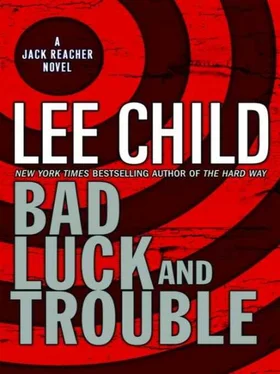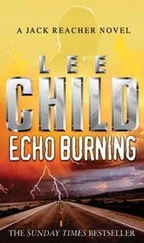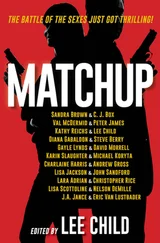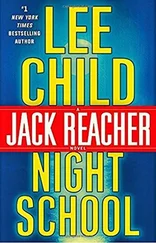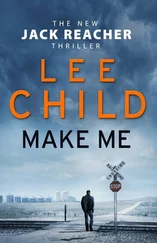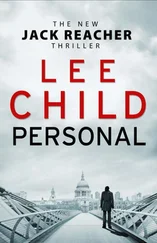Nobody would tell him where home was.
He left his name with all three women. Then he fought his way back to the others and they threaded their way out to the sidewalk. Vegas at one in the morning was still lit up and humming, but after the inside of the bar it felt as quiet and peaceful as the cold gray surface of the moon.
“Plan?” Dixon said.
“We get back here at eleven-thirty in the morning,” Reacher said. “We catch her on her way in to work.”
“Until then?”
“Nothing. We take the rest of the night off.”
They walked back to the Strip and formed up four abreast on the sidewalk for the slow stroll back to the hotel. Forty yards behind them in the traffic a dark blue Chrysler sedan braked sharply and pulled over and came to a stop by the curb.
The man in the dark blue suit called it in immediately: “I found them. Unbelievable. They just popped up right in front of me.”
His boss asked: “All four of them?”
“They’re right here in front of me.”
“Can you take them?”
“I think so.”
“So get it done. Don’t wait for reinforcements. Get it done and get back here.”
The guy in the suit ended the call and moved his car off the curb and swerved it across four lanes of traffic and stopped again in a side street outside a grocery that offered the cheapest cigarettes in town. He climbed out and locked up and headed down the Strip, on foot, fast, with his right hand in his coat pocket.
Las Vegas had more hotel rooms per square inch than any other place on the planet, but Azhari Mahmoud wasn’t in any of them. He was in a rented house in a suburb three miles from the Strip. The house had been leased two years ago for an operation that had been planned but not executed. It had been safe then, and it was safe now.
Mahmoud was in the kitchen, with the Yellow Pages open on the counter. He was leafing through the truck rental section, trying to figure out how big a U-Haul he was going to need.
The Strip had a permanent redevelopment tide that slopped back and forth like water in a bathtub. Once upon a time the Riviera had anchored the glamour end. It had sparked investment that had raced down the street block by block. By the time the improvements had reached the other extremity, the stakes had been raised way high and the Riviera had suddenly looked old and dowdy by comparison with the newer stuff. So the investment had bounced right back again, racing block by block in the reverse direction. The result was a perpetually moving block-long construction site that separated the brand-new stuff that had just been built from the slightly older stuff that was just about to be demolished again. The roadway and the sidewalks were being straightened as the work progressed. The new lanes continued uninterrupted. The old route looped through rubble. The city felt briefly quiet and deserted there, like an uninhabited no man’s land.
That uninhabited no man’s land was exactly where the man in the blue suit came up behind his targets. They were walking four abreast, slowly, like they had a place to go but all the time in the world to get there. Neagley was on the left, Reacher and then O’Donnell were in the center, and Dixon was on the right. Close together, but not touching. Like a marching formation, across the whole width of the sidewalk. Collectively, they made a target maybe nine feet wide. It had been Neagley who had chosen the old sidewalk. She had followed it as if by arbitrary choice and the others had simply followed her.
The man in the suit took his gun out of his right-hand pocket. The gun was a Daewoo DP-51, made in South Korea, black, small, illegally obtained, unregistered, and untraceable. Its magazine held thirteen 9mm Parabellums. It was being carried in what its owner’s long training had taught him was the only safe-transport mode: chamber empty, safety on.
He held the gun right-handed and dry-fired against the locked trigger and rehearsed the sequence. He decided to prioritize and put the biggest targets down first. In his experience that always worked best. So, center-mass into Reacher’s back, then a small jog to the right into O’Donnell’s back, then a radical swing left to Neagley, then all the way back to Dixon. Four shots, maybe three seconds, from twenty feet, which was close enough to be sure of hitting without being so close that the deflections left and right would be extreme. Maximum traverse would be a little more than twenty degrees. Simple geometry. A simple task. No problem.
He glanced all around.
Clear.
He looked behind.
Clear.
He pushed the safety down and gripped the Daewoo’s barrel in his left hand and racked the slide with his right. Felt the first fat shell push upward, neatly into the chamber.
***
The night was not quiet. There was a lot of urban ambient noise. Traffic on the Strip, distant rooftop condensers roaring, extractors humming, the muted rumble of a hundred thousand people playing hard. But Reacher heard the rack of the slide twenty feet behind him. He heard it very clearly. It was exactly the kind of sound he had trained himself never to miss. To his ears it was a complete complex split-second symphony, and every component registered precisely. The scrape of alloy on alloy, its metallic resonance partially damped by a fleshy palm and the ball of a thumb and the side of an index finger, the grateful expansion of a magazine spring, the smack of a brass-cased shell socketing home, the return of the slide. Those sounds took about a thirtieth of a second to reach his ears and he spent maybe another thirtieth of a second processing them.
His life and his history lacked many things. He had never known stability or normality or comfort or convention. He had never counted on anything except surprise and unpredictability and danger. He took things exactly as they came, for exactly what they were. Therefore he heard the slide rack back and felt no disabling shock. No panic. No stab of disbelief. It seemed entirely natural and reasonable to him that he should be walking down a street at night and listening to a man preparing to shoot him in the back. There was no hesitation, no second-guessing, no self-doubt, no inhibition. There was just evidence of a purely mechanical problem laid out behind him like an invisible four-dimensional diagram showing time and space and targets and fast bullets and slow bodies.
And then there was reaction, another thirtieth of a second later.
He knew where the first bullet would be aimed. He knew that any reasonable attacker would want to put the biggest target down first. That was nothing more than common sense. So the first shot would be aimed at him.
Or possibly at O’Donnell.
Better safe than sorry.
He used his right arm and shoved O’Donnell hard in the left shoulder and sent him sprawling into Dixon and then fell away in the opposite direction and crashed into Neagley. They both stumbled and as he was going down to his knees he heard the gun fire behind him and felt the bullet pass through the V-shaped void of empty air where the center of his back had been just a split second before.
He had his hand on his Hardballer before he hit the sidewalk. He was calculating angles and trajectories before he had it out of the waistband of his pants. The Hardballer had two safeties. A conventional lever at the left rear of the frame, and a grip safety released when the butt was correctly held.
Before he had either one set to fire he had decided not to shoot.
Not immediately, anyway.
He had fallen on top of Neagley toward the inside edge of the sidewalk. Their attacker was in the center of the sidewalk. Any angle vectoring from the inside of the sidewalk through the center would launch a bullet out toward the roadway. If he missed the guy, he could hit a passing car. Even if he hit the guy, he could still hit a passing car. A jacketed.45 could go right through flesh and bone. Easily. Lots of power. Lots of penetration.
Читать дальше
